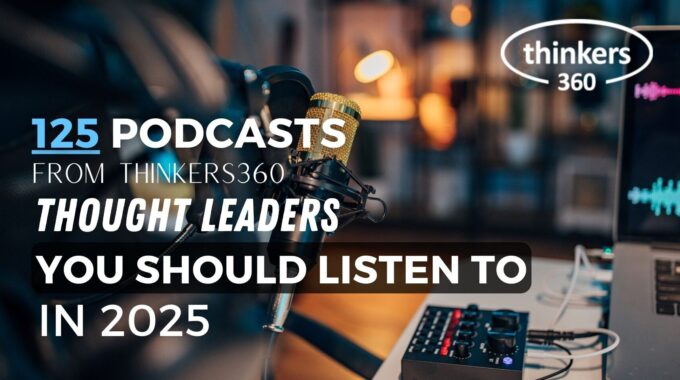Check out Thinkers360 annual leaderboard for the top 50 global thought leaders and influencers on…
Be Obsessively Focused on your Market’s Need to Create a Bingeable Podcast
Define your audience, define the cadence, develop your format, be consistent and see what resonates most with folks. I think the market will tell you what’s working if you’re wise enough to objectively listen to it.
Aspart of my series of interviews about “5 things you need to know to create a bingeable podcast”, I had the pleasure of interviewing Peter Winick. He is the founder and CEO of Thought Leadership Leverage. For the past two decades, he has helped individuals and organizations build and grow revenue streams through designing and growing their thought leadership platforms as well as acting as a guide and advisor for increasing business to business sales of thought leadership products.
Peter has built his career and Thought Leadership Leverage to serve the needs of CEOs, business leaders, and “traditional” thought leaders. He uses a combination of art, science, logic, focus, passion, and creativity to transform a thought leader’s great ideas into a platform and practice so they can effectively reach business leaders and executives to serve them the tools they and their organizations need.
QUESTIONS
Can you tell us a bit of your “personal backstory? What is your background and what eventually brought you to this particular career path?
Great question. So there are two sides (maybe more?) to my back story. One- I’ve always been entrepreneurial. I’ve started businesses, built them, sold them, fixed them, etc. Two-is I’ve always been a content junky. Reading as many books as I can get my hands on, magazines, always taking in as much as I could to learn about things that were of interest to me. Most of the content I gravitated towards was always business content. Leadership, management, sales, execution, growth, emotional intelligence, behavioral economics, etc. Then those two worlds that I thought were not connected or related in any way sort of came together for me. I was brought in to do a turn around of a global communications consulting company that was in trouble in 2004. I learned that there’s an entire business side to content and thought leadership and realized that was my sweet spot.
Can you share a story about the most interesting thing that has happened to you since you started podcasting?
I’ve had the opportunity to interview people whose work I’ve admired from afar for years, Ken Blanchard, Dan Pink, etc. That’s been great.
How long have you been podcasting and how many shows have you aired?
A bit over 2 years. Over 200 episodes so far.
What are the main takeaways, lessons or messages that you want your listeners to walk away with after listening to your show?
Our show is focused on the business side of thought leadership. The “behind the scenes” stuff, the business models, the suite of offerings, etc. I want folks to walk away with some insight and understanding of the business side of thought leadership and how critical it is to be thoughtful and strategic about the business and not just the content you produce.
In your opinion what makes your podcast binge-listenable? What do you think makes your podcast unique from the others in your category? What do you think is special about you as a host, your guests, or your content?
I think for the right person at the right time (thinking about publishing, wanting to grow their business, wanting to transform their business, etc) it’s totally binge-able. What makes Leveraging Thought Leadership unique in the crowded podcast world is we are obsessively focused on the unique needs of our tightly defined market place. We don’t wander into things that are outside of our area of expertise. We provide, through our amazing guests, real insight and practical wisdom that our listeners can learn from and apply to their own businesses.
Doing something on a consistent basis is not easy. Podcasting every work-day, or even every week can be monotonous. What would you recommend to others about how to maintain discipline and consistency? What would you recommend to others about how to avoid burnout?
A good friend gave me some advice many years ago when I started blogging. He told me not to commit to blogging unless I was willing to commit to writing 100 blogs before seeing the true benefit. That’s very much been the case with the podcast. The first 9 months or a year were fun, I learned a lot but it didn’t move our business. Now we have a flywheel effect in place that’s amazing for our brand and is an incredibly cost-effective way of acquiring net new clients.
What resources do you get your inspiration for materials from?
My clients, people who’s work I admire or who are doing very well and or doing things differently.
Is there someone in the podcasting world who you think is a great model for how to run a really fantastic podcast?
There are several, Sri at the Creative Podcast, Gladwell, Adam Grant, NPR, etc. However, I think you need to first define your goals and objectives and then find someone with similar goals to learn from. I’m no Malcolm Gladwell or Adam Grant but in our narrowly defined niche, I have a solid reputation and brand and an understanding of what my clients and prospects struggle with and need help with.
What are the ingredients that make that podcast so successful? If you could break that down into a blueprint, what would that blueprint look like?
Define your audience, define the cadence, develop your format, be consistent and see what resonates most with folks. I think the market will tell you what’s working if you’re wise enough to objectively listen to it.
Can you share with our readers some tips to create an extremely successful podcast?
I’d start by studying what others are doing, being a guest and making sure you have tight processes and systems in place to manage it. I’m not a detail guy at all. I don’t want to learn how to edit or any of the technical stuff. I want to have valuable conversations with interesting people. You need to (if you can) get the support you need so that you can focus on where you create the most value. Usually, it’s not in the editing process.
Podcaster Influencer, Peter Winick of Leveraging Thought Leadership Podcast shares the best ways to:
1) Book Great Guests. A bit of a catch 22. You need great guests to book great guests. In the beginning, I asked well-known clients and folks I knew to be a guest. Now I get pitched by a dozen podcast placement companies. They do the work for you!
2) Increase Listeners. I’m not obsessed with increasing listeners. I think it’s a silly metric for most podcasters. So you went from 200 downloads to 300 per episode, who cares? For me, it’s about using the podcast to build the brand and ultimately start conversations with guests who often become clients.
3) Produce in a Professional Way. We produce the show internally and use zoom and zencastr, get a good mic and headphones, you don’t need to build a radio station. The tech is easy to use and inexpensive today.
4) Encourage Engagement. Make it easy for the guest to promote the episodes when they are published. We provide them with graphics, tweets, posts for LI, etc so that they can basically cut, paste and promote.
5) Monetize. We don’t care about advertising. Our monetization strategy is client acquisition. We’ve won literally millions of dollars of new business as a direct or indirect result of the podcast. We have a process whereby we do a pre podcast call for every potential guest. During that call, we explain who we are, what we do, how we do it, etc and often times those conversations organically become business development opportunities.
For someone looking to start their own podcast, which equipment would you recommend that they start with?
A solid mic and headphones.
If you could inspire a movement that would bring the most amount of good to the greatest amount of people, what would that be? You never know what your idea can trigger.
I’d like organizations (companies, non-profits, etc) to learn to embrace thought leadership to drive their business objectives. It is so hard to separate the signal from the noise in today’s fast-moving market place. Solid thought leadership does that well and does it cost-effectively.
How can our readers follow you online?
On Linkedin or our site is www.thoughtleadershipleverage.com
You can watch Tracy Hazzard’s full interview with Peter Winick below or listen to The Binge Factor on your favorite podcast player.



